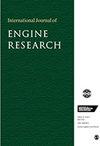以不同液化石油气配方为燃料的改装火花点火式中型发动机的性能和爆震现象分析
IF 2.1
4区 工程技术
Q2 ENGINEERING, MECHANICAL
引用次数: 0
摘要
由于传统燃料正被逐步淘汰,人们开始将发动机改装为使用更具可持续性的燃料,以满足当地的法规要求。液化石油气(LPG)具有减少二氧化碳和当地污染物的潜力,因此成为内燃机的替代燃料。液化石油气的化学结构允许更高的压缩比(CR)和更高的热效率。然而,研究表明,提高压缩比可能会导致爆燃。在这项研究中,使用两种液化石油气配方,即商用丙烷(93.91% 丙烷)和车用燃气(38.42% 丙烷 - 60.37% 丁烷),对发动机转换为液化石油气进行了分析。首先,根据燃料的热化学特性,使用之前提出的数值方法来估计爆震事件。在燃烧模拟中利用低阶方法估算自燃延迟(AID)和层流火焰速度(sL)。其次,使用 4 缸涡轮增压 SI 发动机进行了实验验证。测试采用了三种不同的压缩比:分别为 12.45:1、11.05:1 和 9.86:1。模拟结果表明,与商用丙烷相比,车用天然气的爆震倾向明显更高。实验结果证实,当使用压缩比为 12.45:1 的车用燃气时,会出现爆震现象,导致发动机的最大扭矩比商用丙烷降低 29%。将压缩比降低到 9.86:1 可以最大限度地减少不希望发生的爆震现象。这也导致热效率降低,车用天然气降低 3.8%,商用丙烷降低 4.5%。本文章由计算机程序翻译,如有差异,请以英文原文为准。
Analysis of performance and knock phenomena in a converted spark-ignition medium-duty engine fueled with different LPG formulations
Since traditional fuels are being phased out, engine conversions to more sustainable fuels are being performed to address local regulations. Due to its potential to reduce CO2 and local pollutants, liquified petroleum gas (LPG) stands out as an alternative fuel for internal combustion engines. LPG chemical structure allows for higher compression ratios (CR) and improved thermal efficiency. However, studies indicated that increasing the CR may lead to knocking combustion. In this investigation, an engine conversion to LPG was analyzed using two LPG formulations, commercial propane (93.91% propane) and autogas (38.42% propane − 60.37% butane). First, using a numerical methodology previously proposed for estimating the event of knock based on the thermochemical characteristics of the fuel. Low-order methods are utilized in combustion simulations to estimate autoignition delay (AID) and laminar flame speed (sL ). Second, an experimental validation was performed with a 4-cylinder turbocharged SI engine. It was tested with three different CRs: 12.45:1, 11.05:1, and 9.86:1. Simulation indicates that autogas exhibits a significantly higher tendency to knock compared to commercial propane. Experimental results confirm the occurrence of knocking when using autogas with a CR of 12.45:1, resulting in a 29% reduction in the engine maximum torque compared to commercial propane. Reducing compression to 9.86:1 minimizes the occurrence of undesired knocking. It also leads to a decrease in thermal efficiency by 3.8% for autogas and 4.5% for commercial propane.
求助全文
通过发布文献求助,成功后即可免费获取论文全文。
去求助
来源期刊

International Journal of Engine Research
工程技术-工程:机械
CiteScore
6.50
自引率
16.00%
发文量
130
审稿时长
>12 weeks
期刊介绍:
The International Journal of Engine Research publishes high quality papers on experimental and analytical studies of engine technology.
 求助内容:
求助内容: 应助结果提醒方式:
应助结果提醒方式:


